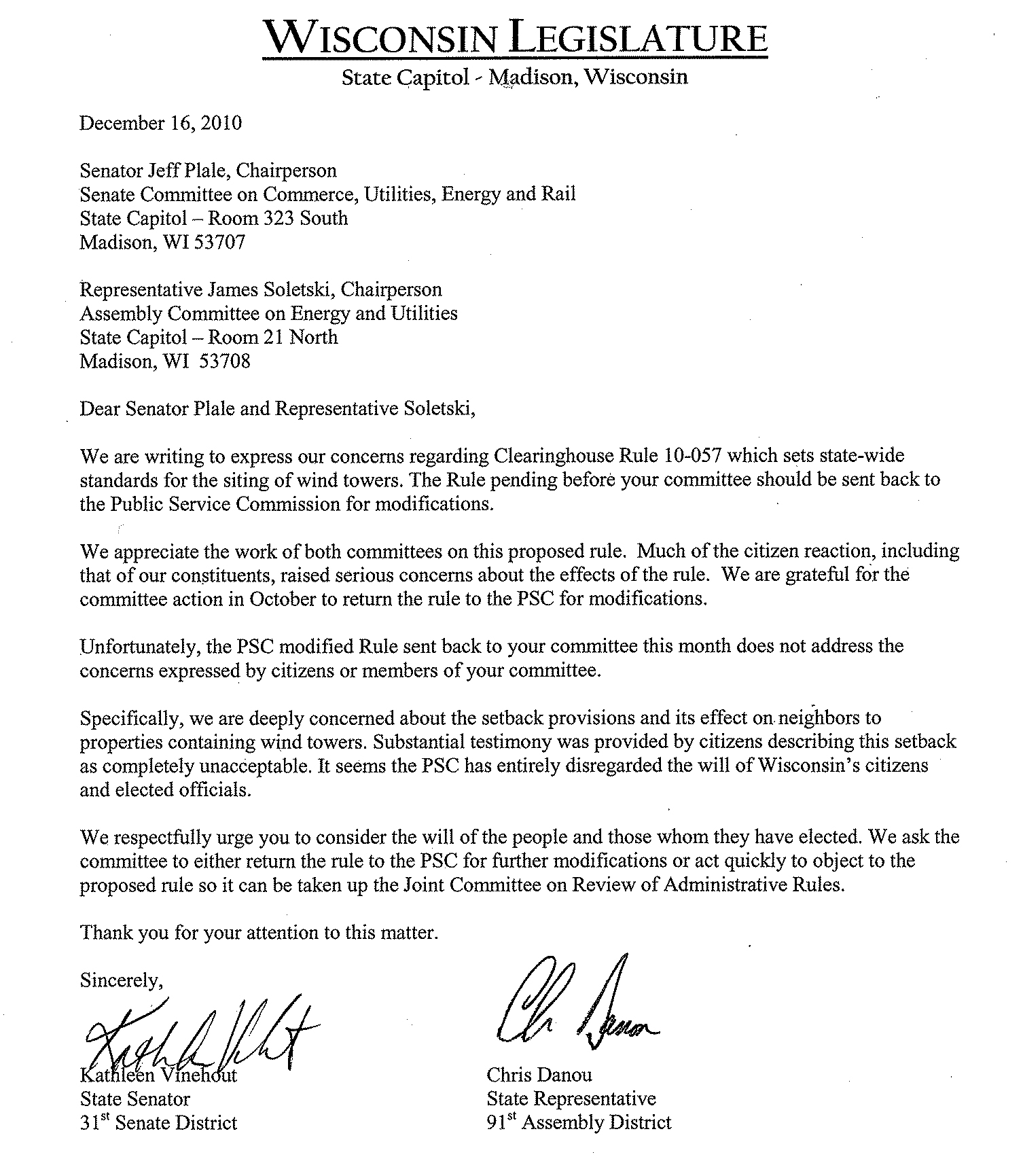Entries in wisconsin public serivce commission (2)
12/20/10 Radio Radio: Listen to wind rules discussed on WORT'S 'A Public Affair' AND! This Just In: Yet another letter from legislators to Senator Plale asking him to object to the wind rules BUT Is there a mailbox in his spider hole?

EXTRA CREDIT READING:
CLICK HERE for Clean Wisconsin's 2009 testimony to the Public Service Commission during the Glacier Hills Wind Project hearings--Clean Wisconsin tells the PSC there will no CO2 reduction because of the implementation of the Glacier Hills project unless the PSC also requires a coal fired plant to be shut down.
Result: The PSC approves the project with no requirement that a coal-fired plant to be shut down.
12/7/09 Clean Wisconsin lives up to its name by taking on the dirty elephant in the room.
December 16, 2010
Dear Senator Plale and Representative Soletski,
We are writing to express our concerns regarding Clearinghouse Rule 10-057 which sets state-wide standards for the siting of wind towers.
The Rule pending before your committee should be sent back to the Public Service Commission for modifications.
We appreciate the work of both committees on this proposed rule. Much of the citizen reaction, including that of your constituents raised serious concerns about the effects of the rule. We are grateful for the committee action in October to return the rule to the PSC for modifications.
Unfortunately, the PSC modified Rule sent back to your committee this month does not address the concerns expressed by citizens of members of your committee.
Specifically, we are deeply concerned about the setback provisions and its effect on neighbors to properties containing wind towers. Substantial testimony was provided by citizens describing this setback as completely unacceptable.
It seems the PSC has entirely disregarded the will of Wisconsin's citizens and elected officials.
We respectfully urge you to consider the will of the people and those whom they have elected. We ask the committee to either return the rule to the PSC for further modifications or act quickly to object to the proposed rule so it can be taken up the Joint Committee on Review of Administrative Rules.
Thank you for your attention to this matter,
Sincerely,
Kathleen Vinehout
State Senator
31st Senate District
Chris Danou
State Representative
91st Assembly District
8/23/10 PSC discusses wind siting rules today AND what do Maine and Wisconsin have in common? What happens when a state changes law to fast track wind development? Good bye local control.
WIND SITING TO BE DISCUSSED BY COMMISSIONERS AT TODAY'S OPEN MEETING AT THE PUBLIC SERVICE COMMISSION OF WISCONSIN
Beginning at 11:30 Am
610 North Whitney Way, Madison, Wisconsin
Live audio of the meeting will be broadcast over the web. CLICK HERE to visit the PSC website, click on the button on the left that says "Live Broadcast". Sometimes the meetings don't begin right on time. The broadcasts begin when the meetings do so keep checking back if you don't hear anything at the appointed start time.
At the last meeting Commissioner Lauren Azar recommended a setback of 2200 feet from homes unless a developer could prove that noise and shadow flicker standards could be met at a closer distance.
She also recommended a 40 decibel noise limit, in accordance with the World Health Organization's nighttime noise guidelines.
A call for a windpower moratorium
August 20, 2010
By Karen Bessey Pease
This law fast-tracks industrial wind development in the high terrain regions of Maine — by eliminating citizens’ automatic right to a public hearing, by removing our ability to object to development based on scenic impact, and by allowing what I consider to be state-sanctioned bribery (couched as “tangible benefits” and “mitigation”) by industrial wind developers of individuals and entities who might be impacted by massive wind turbines on our iconic ridges. LD 2283 can be read in its entirety at: http://www.mainelegislature.org/legis/bills/bills_123rd/billtexts/SP090801.asp
I live in Lexington Township, which stands to be greatly impacted by LD 2283. Former Gov. Angus King and Rob Gardiner of Brunswick’s Independence Wind have submitted a permit application — to be reviewed under this new law — for a 48-turbine development at the gateway to the Bigelow Preserve and the Appalachian Trail.
Local residents have also heard of plans to continue the line of industrial wind down through Lexington to Brighton, Mayfield, and beyond. In order to meet Gov. John Baldacci’s goal of 2,700 megawatts of land-based wind power by 2020, another 300 miles of Maine’s mountains will be sacrificed, as well.
Maine citizens weren’t consulted before this misguided and biased law was enacted. As an “emergency measure” we didn’t have time to make our objections known before it was implemented. What is now apparent is that the wind industry hugely influenced the crafting of this law.
In a letter from Rob Gardiner to Alec Giffen, chairman of the Governor’s Task Force on Wind Power, Gardiner lists his recommendations for how to write a law which would give wind developers the advantage over Maine citizens, forestalling their objections to wind developments.
Gardiner states: “In my opinion, the biggest sticking point is visual impact. Under the standard of ‘fitting harmoniously into the environment,’ wind is at a serious disadvantage. Because it involves 250-foot high structures that are usually on high ridges, the visual impacts are significant.” (Gardiner’s own permit application states that the turbines destined for Highland stand more than 400 feet tall, creating a more serious “disadvantage” — and those visual impacts will be far, far more significant.)
“An immediate executive order followed by legislation that specifically removes the presumption of negative visual impact from wind farms would go a long way toward setting the stage for balanced regulatory review.”
“A second element of such executive order and legislation should be to declare that reducing air pollution and greenhouse gas emissions is a public benefit, and that wind farms can make a significant contribution toward a more sensible energy mix for Maine. Therefore, any regulatory agency should accept these positions and not waste time receiving further evidence and debating them. To the extent that regulators are charged with balancing the benefits of any project against the negative impacts, these beneficial aspects should be ‘a given’ for wind farms.”
Further directions given to Giffen: “…wind farms ought not to be expected to help purchase conservation lands or do other types of mitigation. Wind farms ARE mitigation for our energy consumption habits and for the impacts of fossil fuel consumption.”
“I understand that preserving Maine’s ‘quality of place’ is an important goal for your task force. I fully accept that having wind farms everywhere might ruin that quality.”
“I recognize that LURC feels overwhelmed … This may need attention, but it is a short-term phenomenon. Don’t change the rules, provide the necessary resources. The Governor can do that ... But creating a new agency or shifting responsibilities will, in actuality, make it harder for developers.” (Gardiner’s entire letter can be read at http://highlandmts.org/wp-content/uploads/2010/01/comments_rob_gardiner_120607.pdf)
Impartial experts are speaking out about the negligible ecological benefits of industrial wind. After two decades of experimentation around the globe, there’s been no significant reduction in carbon emissions. Electrical consumption is constant, but wind is undependable and intermittent; therefore, conventional electrical generators must be kept online to take up the slack when the wind doesn’t blow. Because of the extremely inefficient combustion from the modulating in-fill of natural gas backup for wind plants, it’s possible that we may actually be increasing overall fossil fuel use.
The wind industry has repeatedly told us that wind will get Maine off “foreign oil.” However, Maine does not use oil to generate electricity, but rather to heat our homes and power our automobiles — two applications that even John Kerry and Phil Bartlett acknowledge aren’t addressed by wind power.
To say that we’ll reduce our dependence on oil if we install wind turbines across Maine is misleading.
Ms. Schalit’s fact-based series is a wake-up call. In light of these revelations, Maine citizens whose lives have been turned upside down by this legislation are requesting an immediate moratorium on wind plant construction and a careful reexamination of LD 2283 by our Legislature.
Karen Bessey Pease lives in Lexington Township.

